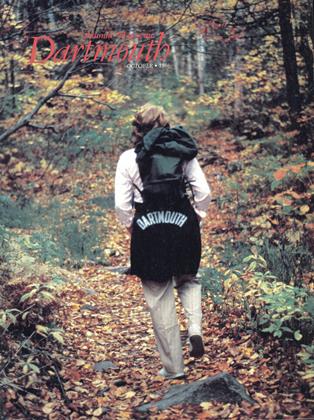Contrary to what most people think, television reporting is not a glamorous or undemanding profession. Point in fact: Ronnie Clemmer '71, feature reporter for WCVB-TV in Boston, on location in King's chapel cemetery in downtown Boston on Halloween night. With him was a group of costumed adults who, on a night normally reserved for children and high school pranksters, were entertaining themselves by touring the city's graveyards. Certainly one would expect this group would make a lively live shot! Unfortunately, it was difficult to tell the adults apart from the gravestones and, in a medium which relies on visual antics, this presented an enormous problem.
Yet, Clemmer made the shoot work. He drew out a response from the crowd, getting them to chant relevant Halloween verse, and conducted three interviews, all the while giving a cadence and flavor to the segment which, without his skill and engaging personality, would have fallen utterly flat.
Clemmer, a native of Texas, began his reporting career in 1978 at WJBK-TV in Detroit. In 1979, he became host of Detroit's "PM Magazine." The years prior to reporting he spent as an English teacher and football and lacrosse coach at Detroit Country Day School. When contemplating the move from teaching to reporting, he sought the advice of a TV news director. "He spent a very polite hour and a half explaining why I would never make it in television," Clemmer remembers. "He said I had a Texas accent, no journalistic education, no experience in the field, too much personality, and I was in the seventh largest market in the country and you just don't walk in, even if you have all of the above."
But within two months, the news director was calling Clemmer for a spot on "PM Magazine" which was expanding to Detroit. After a three-year stint, Clemmer headed to Boston to join WCVB-TV as a feature reporter. In his feature pieces, aptly titled "Clemmer's Corner," he tries to touch his viewer with something "humorous or intriguing or emotional which will remind us in some way of the universal experience that we do share things of a positive nature."
One recent piece which interested many viewers was "A Message to Chicago," a preview of the Superbowl clash between the New England Patriots and the Chicago Bears. The piece aired in Boston and Chicago and nationally on "Nightline." In it, Clemmer walked a fine line between New England arrogance and tounge-in-cheek humor, striking just the right tone necessary to show Chicago fans whose side he was on. In response, Clemmer got letters from as far away as Wyoming and Ohio. One writer who failed to see any humor in the piece dared Clemmer to come out west and "say that to my face." Of course, New England fans loved it.
As Clemmer continues to grow professionally, he finds that he gets the best results when he lets his subject matter dominate the feature. That means that he steps aside and lets the people and pictures tell the story. According to Clemmer's boss, Charlie Kravetz, this is not only the mark of a good reporter, but a good producer as well. "One of Clemmer's strengths is to engage people," Kravetz says, "to get them to come out of their shells and show you their lives." Such talents earned Clemmer two local Emmy nominations for the 1985 season.
Another attribution which benefits Clemmer's reporting is his power of concentration. Covering pre-Superbowl madness in New Orleans meant blocking out hordes of overzealous fans in order to do an intelligible live shot. Such concentration requires the ability to focus mentally, which Clemmer gains by envisioning three of four people in a living room watching his report. In most cases, his live shots go off without a hitch.
Of course, there are times when they don't. "One of the things you have to risk is looking like a fool, which you do periodically, and when you do it, anywhere from a quarter of a million to a half million see it," Clemmer says. That's just one of the drawbacks of a profession which many falsely view as glamorous and not overly demanding. Other drawbacks include long hours (at "PM Magazine" Clemmer worked 90-hour weeks) and the constant pressure of a deadline. The focus of the public spotlight and the need for a tremendous amount of emotional energy also burden the TV reporter.
Clemmer believes his Dartmouth liberal arts education prepared him well for all the demands he faces as a feature reporter. The broadness of his education has helped him cover topics as varied as nuclear fission, the Boston Marathon, and the Shuttle tragedy. Dartmouth also instilled in him a love for literature when as an English major, he concentrated on Victorian and Romance literature. His favorite author, however, is William Faulkner. Faulkner, Clemmer says, urges the reader to look beyond his often chaotic, stream-of-consciousness prose to find discipline and order. And that, in a sense, is what "Clemmer's Corner" is all about. After the tragedies of hard news, Ronnie gives viewers reason to look beyond the chaos to find something positive about human nature. In our corner of Boston, he gives us reason to smile.
Ronnie Clemmer '71, feature reporter for WCVB-TV in Boston, interviews marathon champ BillRodgers prior to the running of the Boston Marathon in April.
Kathy Hoes is a freelance writer in Boston whohopes to break into television producing.
 View Full Issue
View Full Issue
More From This Issue
-
 Feature
FeatureBONFIRE!
October 1986 By Shelby Grantham -
 Feature
FeaturePapa's Son
October 1986 By Everett Wood '38 -
 Feature
FeatureA China Perspective
October 1986 By President David T. McLaughlin '54 -
 Article
ArticleDartmouth Authors
October 1986 By C. E. Widmayer -
 Article
ArticleCarl Thum: Teacher of how to learn
October 1986 By Georgia Croft -
 Sports
SportsThe Key to Defense
October 1986 By Jim Neeciham '70







